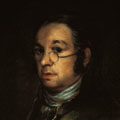








Thus, Venetian painting before it wholly died, flickered up again strong enough to light the torch that is burning so steadily now. Indeed, not the least attraction of the Venetian masters is their note of modernity, by which I mean the feeling they give us that they were on the high road to the art of to-day. We have seen how on two separate occasions Venetian painters gave an impulse to Spaniards, who in turn have had an extraordinary influence on modern painting. It would be easy, too, although it is not my purpose, to show how much other schools of the seventeenth and eighteenth centuries, such as the Flemish, led by Rubens, and the English led by Reynolds, owed to the Venetians. My endeavour has been to explain some of the attractions of the school, and particularly to show its close dependence upon the thought and feeling of the Renaissance. This is perhaps its greatest interest, for being such a complete expression of the riper spirit of the Renaissance, it helps us to a larger understanding of a period which has in itself the fascination of youth, and which is particularly attractive to us, because the spirit that animates us is singularly like the better spirit of that epoch. We, too, are possessed of boundless curiosity. We, too, have an almost intoxicating sense of human capacity. We, too, believe in a great future for humanity, and nothing has yet happened to check our delight in discovery or our faith in life.